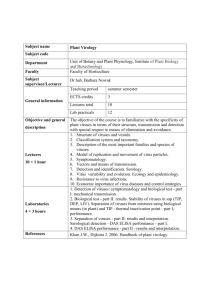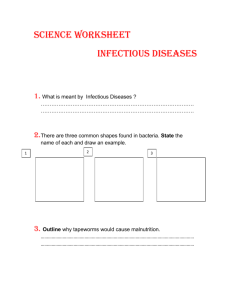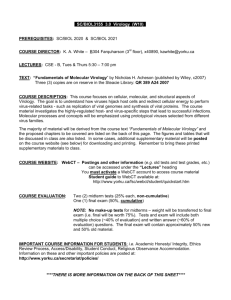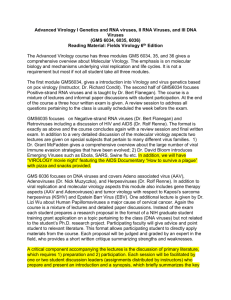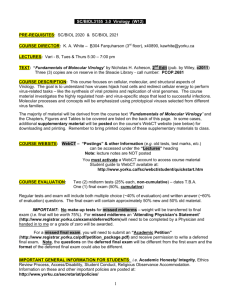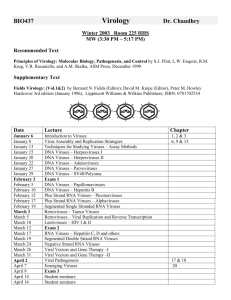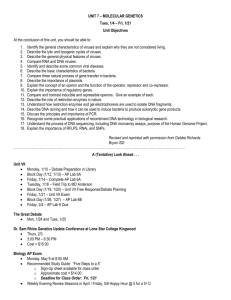M&I 4310/7310 Virology
advertisement
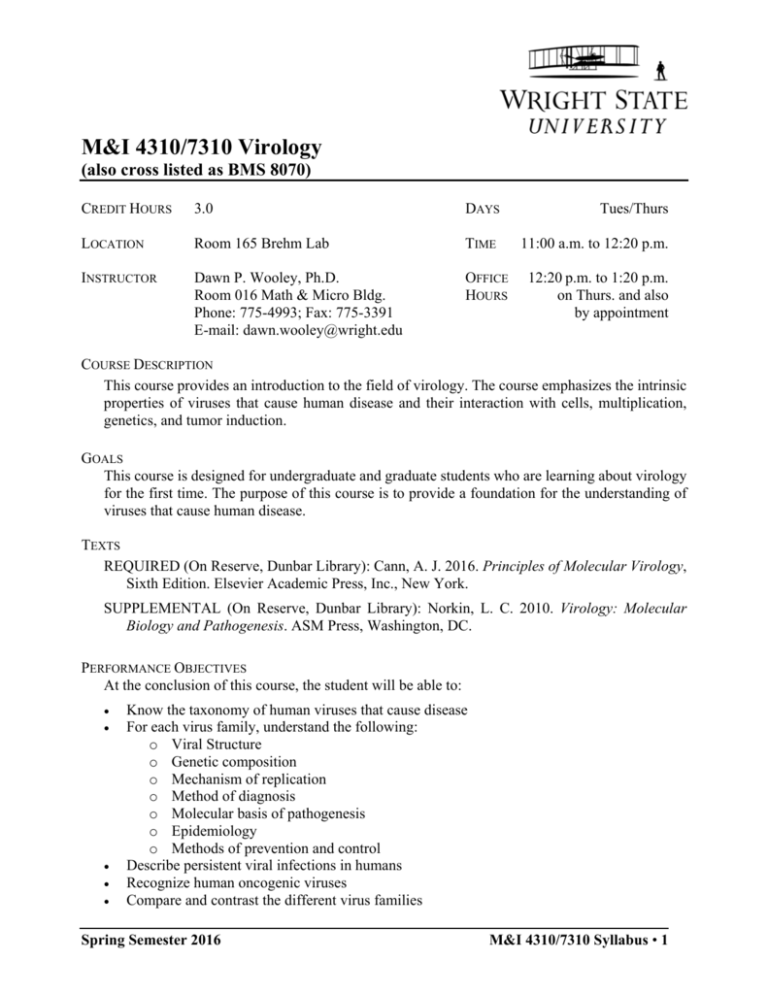
M&I 4310/7310 Virology (also cross listed as BMS 8070) CREDIT HOURS 3.0 DAYS Tues/Thurs LOCATION Room 165 Brehm Lab TIME 11:00 a.m. to 12:20 p.m. INSTRUCTOR Dawn P. Wooley, Ph.D. Room 016 Math & Micro Bldg. Phone: 775-4993; Fax: 775-3391 E-mail: dawn.wooley@wright.edu OFFICE HOURS 12:20 p.m. to 1:20 p.m. on Thurs. and also by appointment COURSE DESCRIPTION This course provides an introduction to the field of virology. The course emphasizes the intrinsic properties of viruses that cause human disease and their interaction with cells, multiplication, genetics, and tumor induction. GOALS This course is designed for undergraduate and graduate students who are learning about virology for the first time. The purpose of this course is to provide a foundation for the understanding of viruses that cause human disease. TEXTS REQUIRED (On Reserve, Dunbar Library): Cann, A. J. 2016. Principles of Molecular Virology, Sixth Edition. Elsevier Academic Press, Inc., New York. SUPPLEMENTAL (On Reserve, Dunbar Library): Norkin, L. C. 2010. Virology: Molecular Biology and Pathogenesis. ASM Press, Washington, DC. PERFORMANCE OBJECTIVES At the conclusion of this course, the student will be able to: Know the taxonomy of human viruses that cause disease For each virus family, understand the following: o Viral Structure o Genetic composition o Mechanism of replication o Method of diagnosis o Molecular basis of pathogenesis o Epidemiology o Methods of prevention and control Describe persistent viral infections in humans Recognize human oncogenic viruses Compare and contrast the different virus families Spring Semester 2016 M&I 4310/7310 Syllabus • 1 GRADING POLICY Award of letter grades, at course completion, reflecting the level of achievement of the course's performance objective is based on the scale: A B C D F 100-90.00% 89.99-80.00% 79.99-70.00% 69.99-60.00% <60.00% Achievement is demonstrated through performance on the following measurement and learning devices: Exam #1 30% Exam #2 30% Final Exam 40% COURSE SCHEDULE The class will meet two times per week for the semester. WEEK 1: CONCEPTS IN VIROLOGY (JANUARY 12 AND 14) Introduction • History • Definitions • Methods Cann and Norkin: Chapters 1 WEEK 2: CONCEPTS IN VIROLOGY (JANUARY 19 AND 21) Virus Structure • Genomes Cann: Chapters 2 and 3; Norkin: Chapter 2 WEEK 3: CONCEPTS IN VIROLOGY (JANUARY 26 AND 28) Replication • Expression Cann: Chapters 4, and 5 WEEK 4: CONCEPTS IN VIROLOGY (FEBRUARY 2 AND 4) Infection • Persistence & Oncology Cann: Chapter 6 and 7; Norkin: Chapters 3, 4, and 20 WEEK 5: EXAM / DNA VIRUSES (FEBRUARY 9 AND 11) EXAM #1 (February 9) • Herpesviridae (February 11) Norkin: Chapter 18 WEEK 6: DNA VIRUSES (FEBRUARY 16 AND 18) Polyomaviridae • Papillomaviridae Norkin: Chapters 15, 16 WEEK 7: DNA VIRUSES (FEBRUARY 23 AND 25) Poxviridae Norkin: Chapters 19 Spring Semester 2016 M&I 4310/7310 Syllabus • 2 WEEK 8: SPRING BREAK (MARCH 1 AND 3) No Classes WEEK 9: DNA VIRUSES (MARCH 8 AND 10) [Journal Articles 1 & 2] / Adenoviridae Norkin: Chapter 17 WEEK 10: DNA VIRUSES / EXAM (MARCH 15 AND 17) [Journal Articles 3 & 4] / Hepadnaviridae / EXAM #2 (March 17) Norkin: Chapter 22 WEEK 11: RNA VIRUSES (MARCH 22 AND 24) [Journal Articles 5 & 6] / Retroviridae Norkin: Chapter 20 WEEK 12: RNA VIRUSES (MARCH 29 AND 31) [Journal Articles 7 & 8] / HIV-1 Lecture • Orthomyxoviridae Norkin: Chapters 21 and 12 WEEK 13: RNA VIRUSES (APRIL 5 AND 7) [Journal Articles 9 & 10] / Paramyxoviridae • Picornaviridae Norkin: Chapters 11 and 6 WEEK 14: RNA VIRUSES (APRIL 12 AND 14) [Journal Articles 11 & 12] / Coronaviridae • Filoviridae Norkin: Chapters 9 and 13 WEEK 15: RNA VIRUSES (APRIL 19 AND 21) [Journal Articles 13] Flaviviridae • Rhabdoviridae Norkin: Chapters 7, 10 FINAL EXAM: THURSDAY, APRIL 28 AT 10:15 a.m. TO 12:15 a.m. GRADUATE STUDENTS ONLY: Journal Article Presentation to Class as Assigned DAWN P. WOOLEY, PhD, SM(NRCM), RBP, CBSP Spring Semester 2016 M&I 4310/7310 Syllabus • 3
